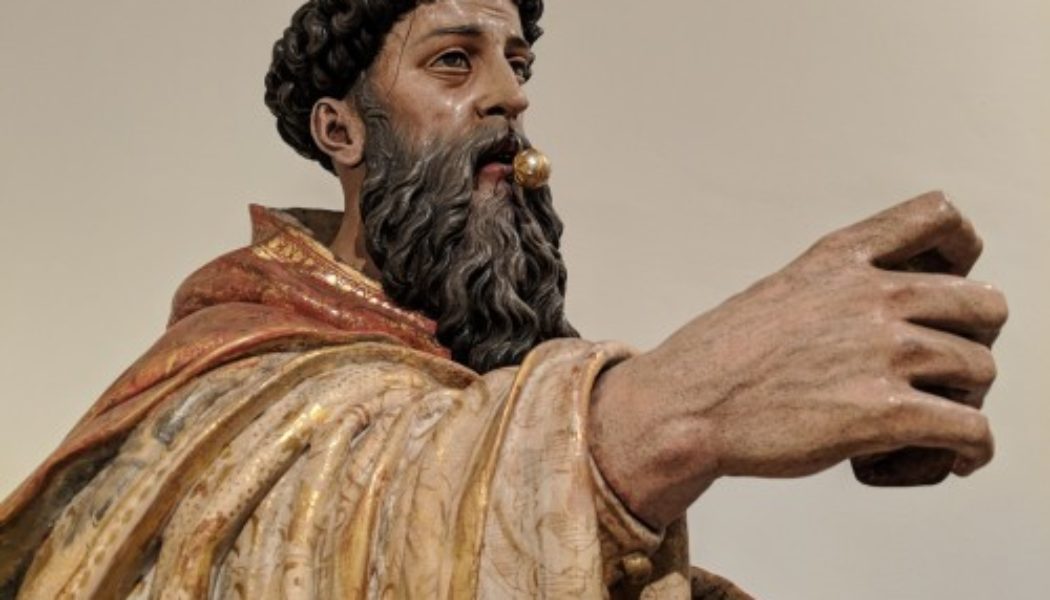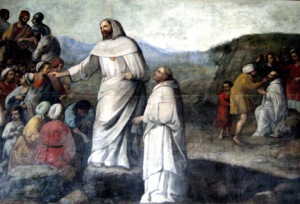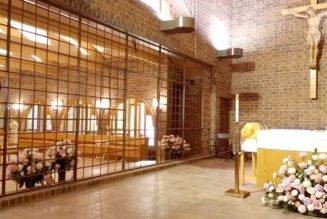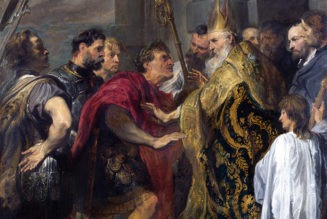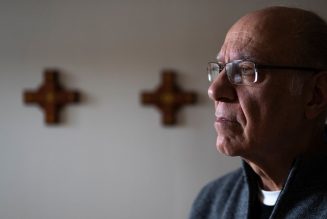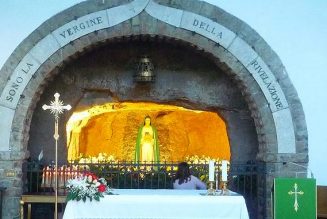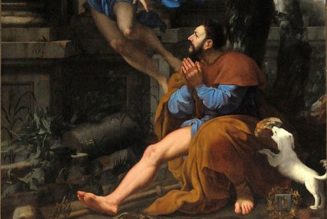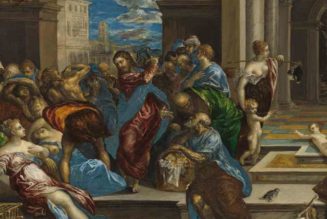St. Raymond Nonnatus – August 31
August 31, 2023 by Amy Welborn
Back to Spain….another image from the Museo de Bellas Artes in Seville during our 2019 visit.
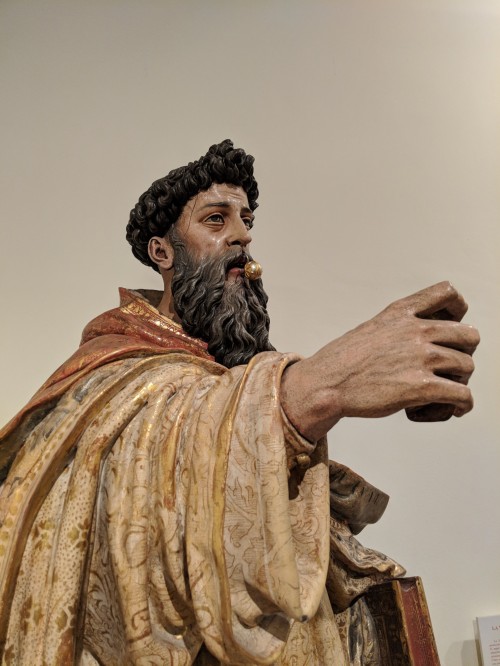
Be bloody, bold, and resolute.
Laugh to scorn
The power of man, for none of woman born
Shall harm Macbeth.
Well, that’s not appropriate, is it? Okay, not really, but it’s what naturally popped into my head when I learned about today’s saint and what his name means…
Born in Spain in the 13th century, yet “not born” – the meaning of his nickname, nonnatus. How could that be? Because he was taken from mother, who had died in labor, one month prematurely. The meaning of “born” was via the birth canal, hence emerging via Caesarean section would not come under the strict definition of “born.” (Sorry for the Macbeth spoiler, there.)
Raymond, once an adult, joined the Mercederians:
The Order of the Blessed Virgin Mary of Mercy is an international community of priests and brothers who live a life of prayer and communal fraternity. In addition to the vows of poverty, chastity and obedience, their members take a special fourth vow to give up their own selves for others whose faith is in danger.
The Order, also called the Mercedarians, or Order of Mercy, was founded in 1218 in Spain by St. Peter Nolasco to redeem Christian captives from their Muslim captors. The Order exists today in 17 countries, including Spain, Italy, Brazil, India, and the United States. In the U.S., its student house is in Philadelphia, and it also has houses in New York, Florida, and Ohio.
Today, friars of the Order of Mercy continue to rescue others from modern types of captivity, such as social, political, and psychological forms. They work in jails, marginal neighborhoods, among addicts, and in hospitals. In the United States, the Order of Mercy gives special emphasis to educational and parish work.
****
According to the most reliable Mercedarian tradition, Saint Raymond was born in the town of Portello, situated in the Segarra region of the Province of Lérida at the dawn of the thirteenth century. He was given the surname of Nonnatus or not born because he came into the world through an inspired and urgent incision which the Viscount of Cardona made with a dagger in the abdomen of the dead mother. In his adolescence and early youth, Raymond devoted himself to pasturing a flock of sheep in the vicinity of a Romanesque hermitage dedicated to Saint Nicholas where an image of the Virgin Mary was venerated. His devotion to the Holy Mother of Jesus started there.
He joined the Order of Mercy at a very early age. Father Francisco Zumel relates that young Raymond was a “student of the watchful first brother and Master of the Order, Peter Nolasco.” Therefore, Raymond was a redeemer of captives in Moorish lands. In a redemption which took place in Algiers, they had to stay behind as hostages. It was then that he endured the torment of having his lips sealed with an iron padlock to prevent him from addressing consoling words to Christian captives and from preaching the liberating good news of the Gospel. After he had been rescued by his Mercedarian brothers, Pope Gregory IX appointed him Cardinal of the Church of San Eustaquio. Summoned by the Supreme Pontiff, Raymond was on his way to Rome when he met death in the strong and rocky castle of Cardona in 1240
As I said, the image above is from our visit to the Museo de Bellas Artes in Seville – a statue of San Ramon Nonato, as it would be in Spanish.
He is invoked as a patron of childbirth expectant mothers, midwives, the falsely accused and others.
Here’s a pdf with more detail about his life.
Some other interesting facts:
A few years ago, Pope Francis declared a “Year of Mercy.” It might be helpful to consider that this “beating heart of the Gospel” – the merciful love of God – has been lived out, shared, expressed and embodied in countless ways over the past two thousand years, not least in the ordinary, amazing thing that happens thousands of times every day in every nation, in which Christ meets us in the Sacrament of Reconciliation.
It is helpful to study and reflect on the creative and courageous ways in which the saints have reached out to the peripheries and margins with God’s mercy and freedom, risking their own physical lives for the sake of the souls of others.
So here, we have an entire religious order (not the only one) established to share God’s mercy in a particular apostolate, and today’s saint willingly and joyfully devoted his life to this – mercy.
Here, from the museum’s FB page, another view of the statue from a higher angle, not possible for the short of stature museum visitor. Along with a short view of the saint’s life. Would we see American museums doing that for any of the countless saints’ images (and dare we say, relics) in their collections .
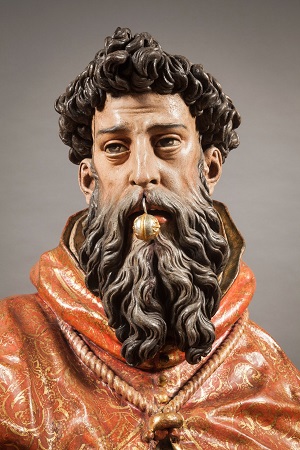
Take a look at that padlock. It’s more than a Weird Catholic Thing. It’s a sign, a symbol. Of what? Perhaps of the lengths to which we – as individuals, as societies, as institutional blobs – will go to to prevent God’s beloved creatures from hearing the Good News that they are loved, forgiven and can be made new in Christ.
And perhaps, instead of railing against the “past” (whatever that is – 10 years ago? 60? 2000?) – we can return to see the life of the Church properly – as a dynamic whole made of human beings, not that different from us, responding to the promptings of the same Spirit, sharing the mercy of the same God to a world that is ever hurting, filled with pilgrims ever seeking. And having understood this, we can see the witness of St. Raymon Nonnatus as something far more that Catholic Weird, and we can see that looking to him is not a symptom of the mortal sin of “backwardism”- but is part of the healthy, life-filled commitment to the present: to look to St. Raymond for what he can teach us through his life, which just might be – despite being in the past – a still very relevant sign of the reality of the world’s resistance to God’s mercy – and what it takes to overcome that resistance.
